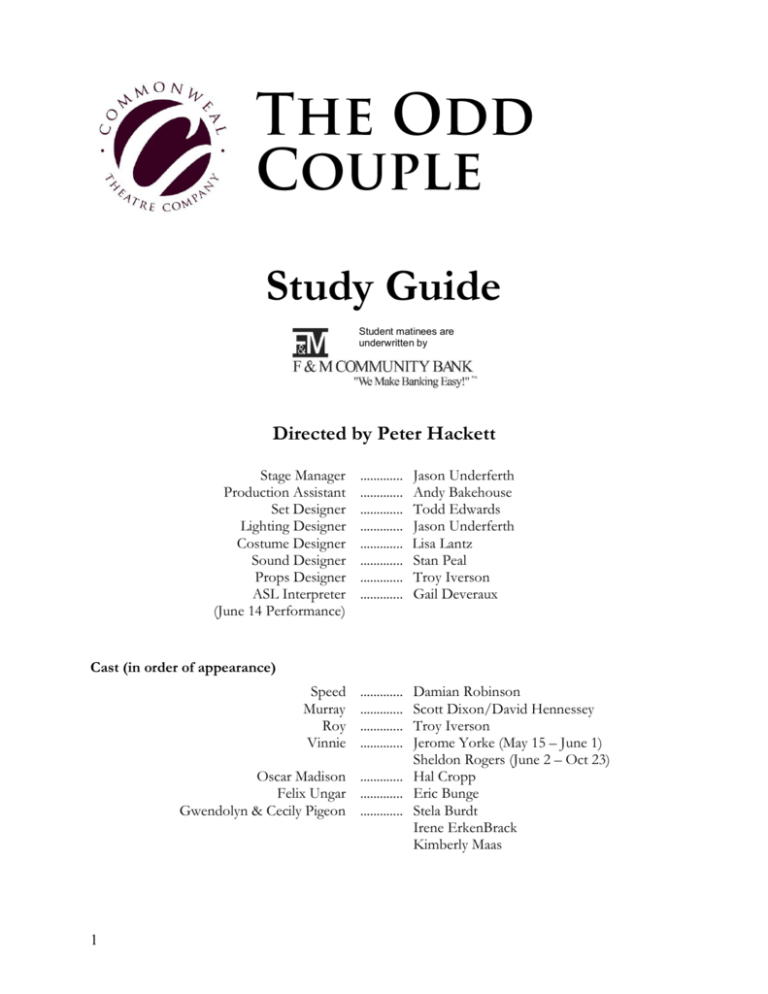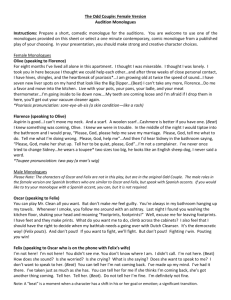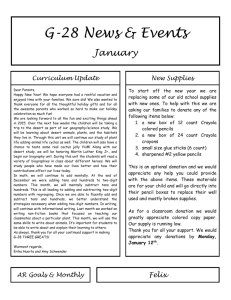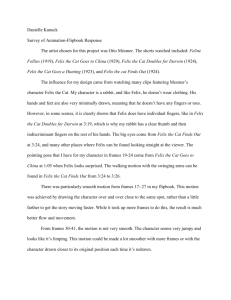Welcome to our Thirteenth Season
advertisement

Study Guide Student matinees are underwritten by Directed by Peter Hackett Stage Manager Production Assistant Set Designer Lighting Designer Costume Designer Sound Designer Props Designer ASL Interpreter (June 14 Performance) ............. ............. ............. ............. ............. ............. ............. ............. Jason Underferth Andy Bakehouse Todd Edwards Jason Underferth Lisa Lantz Stan Peal Troy Iverson Gail Deveraux Cast (in order of appearance) Speed Murray Roy Vinnie Damian Robinson Scott Dixon/David Hennessey Troy Iverson Jerome Yorke (May 15 – June 1) Sheldon Rogers (June 2 – Oct 23) Oscar Madison ............. Hal Cropp Felix Ungar ............. Eric Bunge Gwendolyn & Cecily Pigeon ............. Stela Burdt Irene ErkenBrack Kimberly Maas 1 ............. ............. ............. ............. An apartment in New York City, July 1965. This play will be performed with two intermissions ACT 1 It’s a Friday night, and somewhere amidst the beer cans, empty pizza boxes, and general trash of Oscar Madison’s apartment, a poker game is going on. Almost all of the regulars are there – Speed, Murray, Roy & Vinnie – but there’s one notable absence. No one knows where Felix Ungar is, and the guys are worried. Then Murray’s wife calls with news from Felix’s wife, Frances. Yesterday, she threw him out of the house and he hasn’t been seen since (although he did send a telegram announcing his intention to kill himself). There’s a knock at Oscar’s door – it’s Felix. At first, the poker buddies try to play it cool as if they knew nothing of Felix’s troubles, but finally his hint-dropping gets them involved. After calming Felix, the game breaks up and the guys leave Oscar alone to comfort Felix over his separation. Oscar, who is himself recently divorced, offers to share his apartment with his best friend until he can get on his feet again. ACT 2 It’s two weeks later – poker night once again – but with Felix running back and forth to the kitchen and sweeping up every crumb that drops on the floor, the gang can’t even make it through a single hand. One by one they throw in their cards and head out, with Murray making a passing remark that Oscar and Felix have it made. They’re two bachelors living alone with no responsibilities to a wife or to kids. They can do whatever they want, whenever they want. Truth of the matter is, there’s trouble in Paradise. Oscar’s slovenliness and Felix’s fastidiousness are coming into direct conflict with one another. After some badgering back and forth, Oscar hits upon the perfect solution – they need to spend more time with people “who’s voices are higher than ours,” he says. He arranges a double date with Gwendolyn and Cecily Pigeon, a pair of attractive sisters who live right upstairs. The next night, Oscar – excited for the date - comes home to find a fuming Felix. Not only is Oscar late (thus jeopardizing the quality of Felix’s main course), but he gets caught telling a lie that he had to work late when, in fact, Felix knows he’s been out to a bar for the past few hours. Their argument is cut short, however, by the arrival of the Pigeon Sisters. Oscar exits into the kitchen to fix drinks for everyone, leaving Felix to entertain the ladies. He promptly begins pouring out his heart to them, lamenting his separation, and by the time Oscar returns, everyone is openly weeping. Somehow, this seems to soften the blow of the news that Felix’s roast is ruined. 2 The Pigeon Sisters then invite Oscar and Felix up to their apartment to rummage for leftovers. Oscar is raring to go, but Felix refuses to go along because he’s feeling guilty and awkward and depressed. Oscar rages at him, but Felix refuses to budge and Oscar heads upstairs alone. ACT 3 It is the next day, and Oscar’s night with the Pigeon Sisters did not go as he’d hoped – a situation for which he blames Felix. The two have an all-out fight which ends with Oscar throwing Felix out the apartment. Almost immediately, Oscar is wracked with guilt which he shares with the poker buddies who have arrived for their weekly game. Before anyone can take any action, however, Gwendolyn Pigeon knocks at the door and asks for Felix’s things. It seems that Felix took refuge with the ladies upstairs and they have invited him to stay with them for a few days while he figures out what to do next. Oscar and Felix eventually come to the important realization that as roommates, they wound up driving each other crazy in exactly the same ways that they did with their ex-wives. For the sake of their friendship, they need never to live under the same roof again but perhaps – in the short time they spent together – a little bit of themselves rubbed off on the other. As the curtain falls, Felix is off with the Pigeon Sisters and Oscar is back at his poker table – with a special admonition to the guys to keep the place neat. I have a confession to make. Until this production, I had never seen or even read The Odd Couple. How is that possible? In addition to the original play, Simon authorized many spin-offs and adaptations including a 1968 film; a 1998 sequel; a TV sitcom (1970-75); an animated series (197576); a second TV show with an African-American cast (1982); a female stage version (1981); and an updated stage adaptation (2004). I somehow managed to miss them all. As in many classic comedies, Simon has his characters, Felix and Oscar, cling tenaciously to the comforting fallacy that they are in total control of their lives. Shortly after being thrown out by his wife, Felix says, “I don’t want to get divorced, Oscar. I don’t want to suddenly change my whole life.” Like watching dogs running in circles trying to catch their tails, we delight in their desperate but fruitless attempts to keep everything in their world exactly the same. My first encounter with this script has had me laughing out loud for months. Many thanks to Hal and the Commonweal for the opportunity to work on this timeless American gem. ~ Peter Hackett 3 A Bronx native born on July 4, 1927, Marvin Neil Simon grew up in Manhattan and for a short time attended NYU and the University of Denver. His first significant writing job came in the early 1950s as part of the writing staff of Your Show of Shows, Sid Caesar’s live television comedy series, which included the likes of Mel Brooks, Larry Gelbart and Carl Reiner. By the 1960s, Simon had switched to writing for the stage and quickly had a string of hits starting with Come Blow Your Horn, Barefoot in the Park, and The Odd Couple. At one point in 1966, four Neil Simon plays were running simultaneously on Broadway. Throughout his four-decade career, Simon has drawn extensively on his own life experience in the working-class New York neighborhoods. One of his trademark achievements has been his “Eugene Trilogy” (Brighton Beach Memoirs, Biloxi Blues and Broadway Bound) the story of Eugene Jerome from his adolescence in New York City through his time and the Army and his return to New York as an aspiring comedy writer. To date, Neil Simon has garnered four Academy Award nominations, fourteen Tony nominations for Best Play (3 wins) and the Pulitzer Prize in 1991 for Lost in Yonkers. In 1983, the Alvin Theatre on Broadway was renamed The Neil Simon Theater. Oscar Madison Walter Matthau Felix Ungar Art Carney 1965 Broadway Premiere Walter Matthau Jack Lemmon 1968 Feature Film Jack Klugman Tony Randall 1970 – 1975 Television Series Rita Moreno (as “Olive Madison”) Sally Struthers (as “Florence Ungar”) 1985 Broadway Revival (female version) Nathan Lane Matthew Broderick 2005 Broadway Revival 4 “Well, it’s about two men who are divorced, move in together to save money to pay their alimony, and have the same fights with each other as they did with their wives.” That was how playwright Neil Simon described the concept of his new script to his Hollywood agent and since then the premise of “the odd couple” has become a staple of theatre, television and film. It’s been explored in virtually every genre from comedy to drama (i.e. Rain Man) to action (i.e. 48 Hours, Lethal Weapon). We know it when we see it – two protagonists (most often male) with opposite styles and demeanors are put together in some kind of close, and usually stressful, situation. At first they clash but gradually – grudgingly even – begin to appreciate one another. As an idea, it’s dramatic gold. Simon’s agent on the other end of that initial phone conversation knew he could sell Hollywood studios on the concept even before the play had actually been written, much less performed. So what about this concept do we find so automatically attractive? Perhaps it starts with a tendency for us to seek out the familiar. The homogenous nature of most urban and suburban streets bear testament to that – the same stores, same restaurants, same houses even. The tougher the times – personally or nationally – the stronger the need seems to be for this comfort even as going about our daily lives often denies us that comfort. Of course, one person’s “familiar” shall forever be another’s “exotic” or “alien”. The comedy created from the worlds of Oscar and Felix colliding is a microcosm of the chaos we frequently encounter when we, ourselves, are in a position of needing to reach across some divide (age, gender, race, religion, culture, etc). We feel lost, frustrated, perhaps even threatened. Yet even this stress is familiar, even this strife is comforting, because we so readily recognize a struggle like that of Madison v. Ungar in our own attempts to impose a sense of order (i.e. predictability) and the attendant illusion of control on our lives. Yet no matter what we do, no matter how much we try to make the world around us the same, it seems that individuality ultimately wins out. Like mythical beings worthy of being immortalized in constellations, Oscar and Felix are forever clashing somewhere and we know this because as a storyteller, Neil Simon put his finger squarely on one of the strongest pulses of our life-experience. A simple idea – this encounter with “The Other” – yet with complex issues swirling just under the surface. As we watch the Battle of the Roommates unfold, do we root for one or the other to change, to bend, to compromise? Or do we more admire each combatant for their steadfastness in 5 this challenge to their wills? The answer may say more about our own comfort with “The Odd” than we realize. Neil Simon used the name “Felix Ungar” in a previous play (as a referred to, but never seen, acting instructor in Come Blow Your Horn). Walter Matthau was the producers’ first choice to play Oscar Madison on Broadway, but he initially insisted on being cast as Felix (until Simon talked him out of it). Simon’s inexperience with the business of show business led him to sell for cheap the ancillary rights to The Odd Couple. As a result, he never earned a cent from any of the popular television series based on his work, either in broadcast or syndication. source Rewrites: A Memoir, Neil Simon, Simon & Schuster, 1998 1. Felix and Oscar have two very different styles of living and going about their lives. Do you see one of them as being “right” and the other “wrong”? Why? 2. As supposed “best friends”, Felix and Oscar spend a lot of time arguing in this play. Why do you think they are friends, and what is the basis of that friendship? 3. In ancient Greek theatre, plays would include a “chorus” – a group of people who provided the audience with any needed historical information about the characters and who served as a moral conscience throughout the story. Is there a “Greek Chorus” in this play? Who are they, and what purpose do they serve in this comedy? 4. Does this play have a moral lesson that is learned by the end? If so, what is it? 5. Comedy is sometimes defined as tragedy that happens to other people. In a play where so many tragic things occur to the main characters, does this explain why it’s so funny? What would have to be taken out of the play if we did not want the audience to laugh at what Oscar and Felix go through? 6 6. At the end of the play, do you think that Oscar and Felix have influenced one another or not? And would you want either of them to change, or stay true to who they were at the beginning of the play? 7. Neil Simon relies heavily on sarcasm for the humor in this play. How do the different characters use this practice as a defense mechanism, or to insult one another, or to display affection? How does the context of some of these comments affect how the words are supposed to be taken? 8. Technical aspects of plays can be used to add new levels of storytelling. Notice the way the design of the set, lights, costumes and props create the world of the play. What impact do these choices have on you as an audience member? How do they help the telling of the story? 9. 7 If you were to write this play today, what two real people (from politics, sports, entertainment, etc) would make the funniest “odd couple”?








